A lawyer for Julian Assange complained Tuesday that the WikiLeaks founder was handcuffed 11 times, stripped naked twice and had court papers taken away on the first day of a hearing on his extradition to the United States.
Attorney Edward Fitzgerald told a judge that the treatment of Assange at London's Belmarsh Prison “could be a contempt of this court.” The extradition hearing opened on Monday at Woolwich Crown Court, which is located next to the prison.
District Judge Vanessa Baraitser, who is hearing the case, said she had no power to act unless Assange became unable to participate in the proceedings, which are expected to last several months.
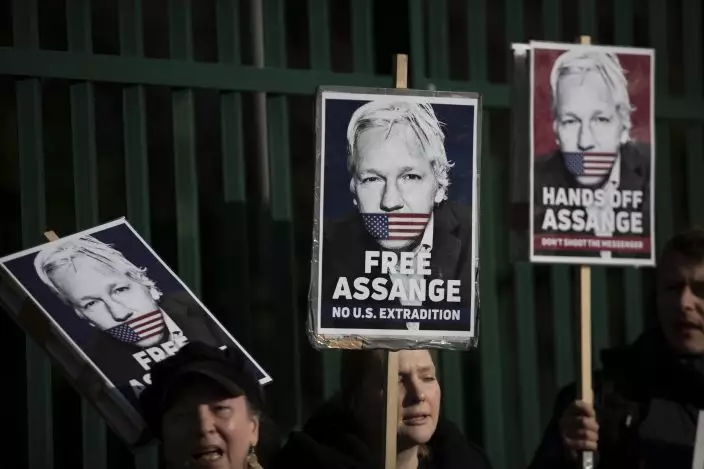
Supporters of Julian Assange hold placards as they protest on the second day of a week of opening arguments for the extradition of Wikileaks founder Julian Assange outside Belmarsh Magistrates' Court in south east London, Tuesday, Feb. 25, 2020. U.S. authorities, want to try Assange on espionage charges. A lawyer for the Americans said the Australian computer expert was an “ordinary” criminal whose publication of hundreds of thousands of secret military documents put many people at risk of torture and death. (AP PhotoMatt Dunham)
"If it comes to that, please let me know,” the judge said.
Assange is wanted in the U.S. on espionage charges over the leaking of classified government documents a decade ago.
U.S. prosecutors accuse Assange of conspiring with U.S. Army intelligence analyst Chelsea Manning to crack a password, hack into a Pentagon computer and release hundreds of thousands of secret diplomatic cables and military files on the wars in Iraq and Afghanistan.

Members of the legal team for Wikileaks founder Julian Assange, from left, Barry Pollack from the U.S., Jennifer Robinson and Baltasar Garzon from Spain arrive for the second day of a week of opening arguments for the extradition of Wikileaks founder Julian Assange outside Belmarsh Magistrates' Court in south east London, Tuesday, Feb. 25, 2020. U.S. authorities, want to try Assange on espionage charges. A lawyer for the Americans said the Australian computer expert was an “ordinary” criminal whose publication of hundreds of thousands of secret military documents put many people at risk of torture and death. (AP PhotoMatt Dunham)
They allege that WikiLeaks' publication of the unedited documents put U.S. intelligence sources who were mentioned in them at risk of torture of death.
Assange says he was acting as a journalist entitled to First Amendment protection. His lawyers argue that the U.S. charges — which carry a maximum sentence of 175 years in prison — are a politically motivated abuse of power.
Defense lawyers also deny that Assange put lives at risk. Attorney Mark Summers said WikiLeaks initially worked with media outlets in 2010 to publish the trove of files in edited form.
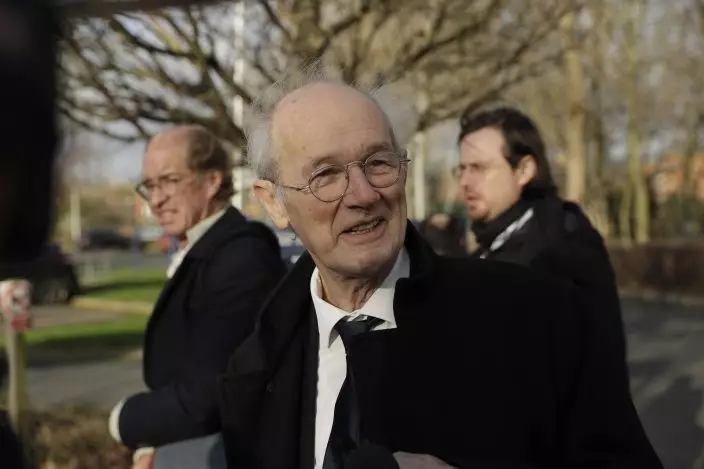
Julian Assange's father John Shipton speaks to the media as he arrives with his son and Julian's half-brother Gabriel Shipton, right, on the second day of a week of opening arguments for the extradition of Wikileaks founder Julian Assange outside Belmarsh Magistrates' Court in south east London, Tuesday, Feb. 25, 2020. U.S. authorities, want to try Assange on espionage charges. A lawyer for the Americans said the Australian computer expert was an “ordinary” criminal whose publication of hundreds of thousands of secret military documents put many people at risk of torture and death. (AP PhotoMatt Dunham)
He said that the following year Assange phoned the White House to warn that a password published in a book about WikiLeaks could allow people to view the full unredacted cache of documents. Summers said Assange had warned that "unless we do something, then people's lives are put at risk."
Assange has been jailed in England since April 2019, when he was evicted from the Ecuadorian Embassy in London. He took refuge in the embassy seven years earlier to avoid being sent to Sweden over allegations of rape and sexual assault.
A British court handed him a 50-week sentence for jumping bail in 2012.
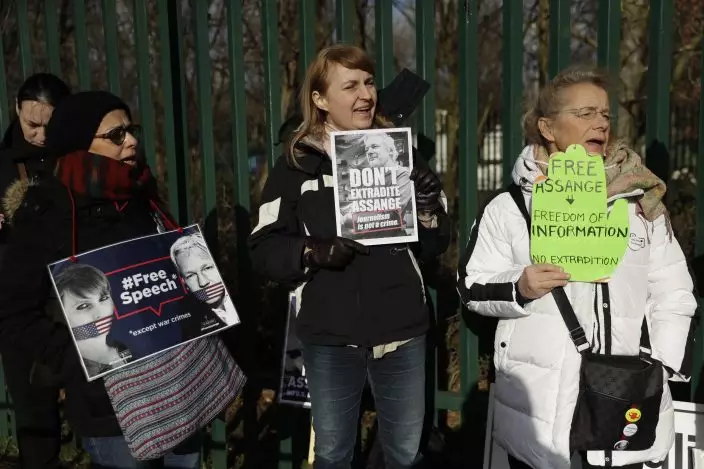
Supporters of Julian Assange hold placards as they protest on the second day of a week of opening arguments for the extradition of Wikileaks founder Julian Assange outside Belmarsh Magistrates' Court in south east London, Tuesday, Feb. 25, 2020. An end to the saga could still be years away. After a week of opening arguments, the extradition case is due to break until May, when the two sides will lay out their evidence. The judge isn't expected to rule until several months after that, with the losing side likely to appeal. (AP PhotoMatt Dunham)
The extradition hearing is expected to continue for the rest of the week, then take a break before resuming in May.
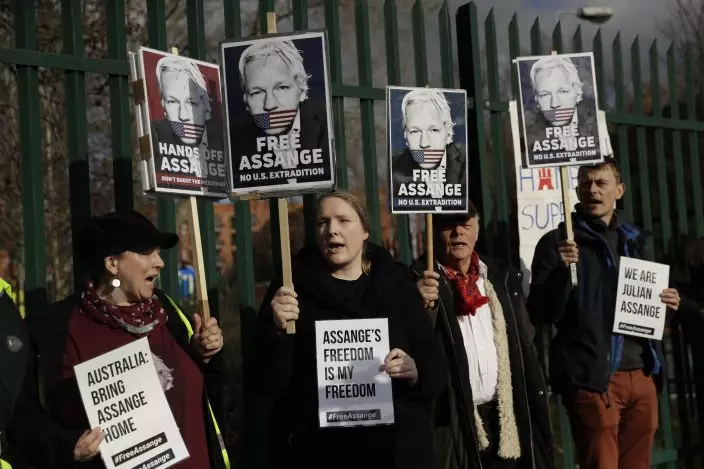
Supporters of Julian Assange hold placards as they protest on the second day of a week of opening arguments for the extradition of Wikileaks founder Julian Assange outside Belmarsh Magistrates' Court in south east London, Tuesday, Feb. 25, 2020. U.S. authorities, want to try Assange on espionage charges. A lawyer for the Americans said the Australian computer expert was an “ordinary” criminal whose publication of hundreds of thousands of secret military documents put many people at risk of torture and death. (AP PhotoMatt Dunham)
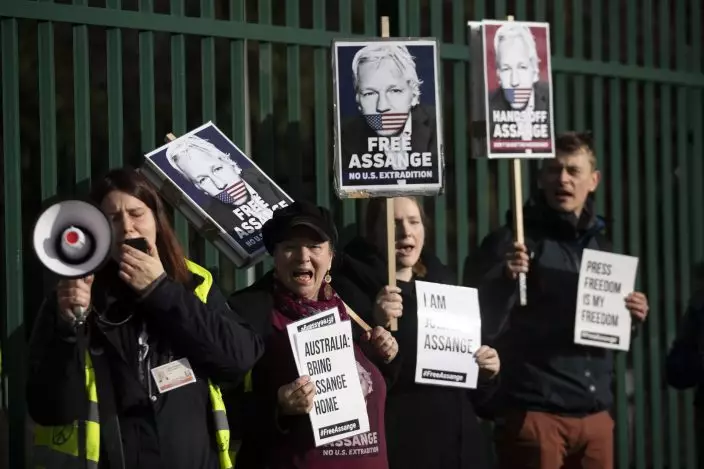
Supporters of Julian Assange hold placards as they protest on the second day of a week of opening arguments for the extradition of Wikileaks founder Julian Assange outside Belmarsh Magistrates' Court in south east London, Tuesday, Feb. 25, 2020. U.S. authorities, want to try Assange on espionage charges. A lawyer for the Americans said the Australian computer expert was an “ordinary” criminal whose publication of hundreds of thousands of secret military documents put many people at risk of torture and death. (AP PhotoMatt Dunham)


